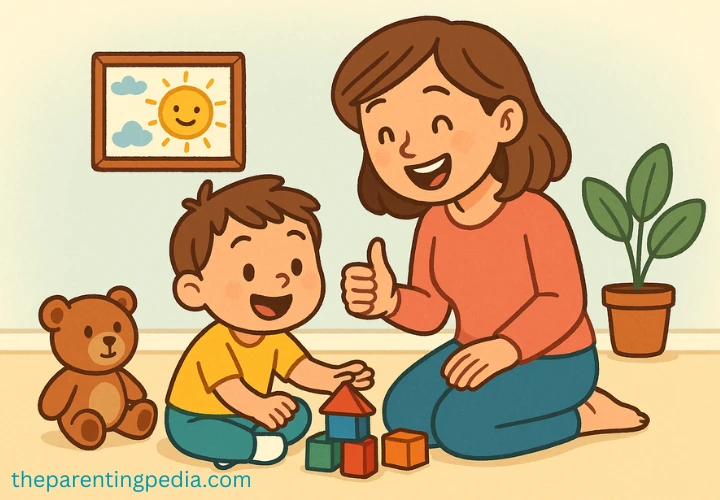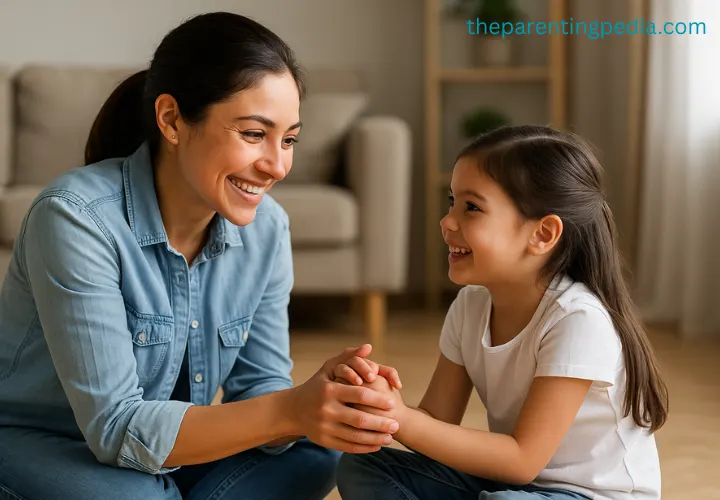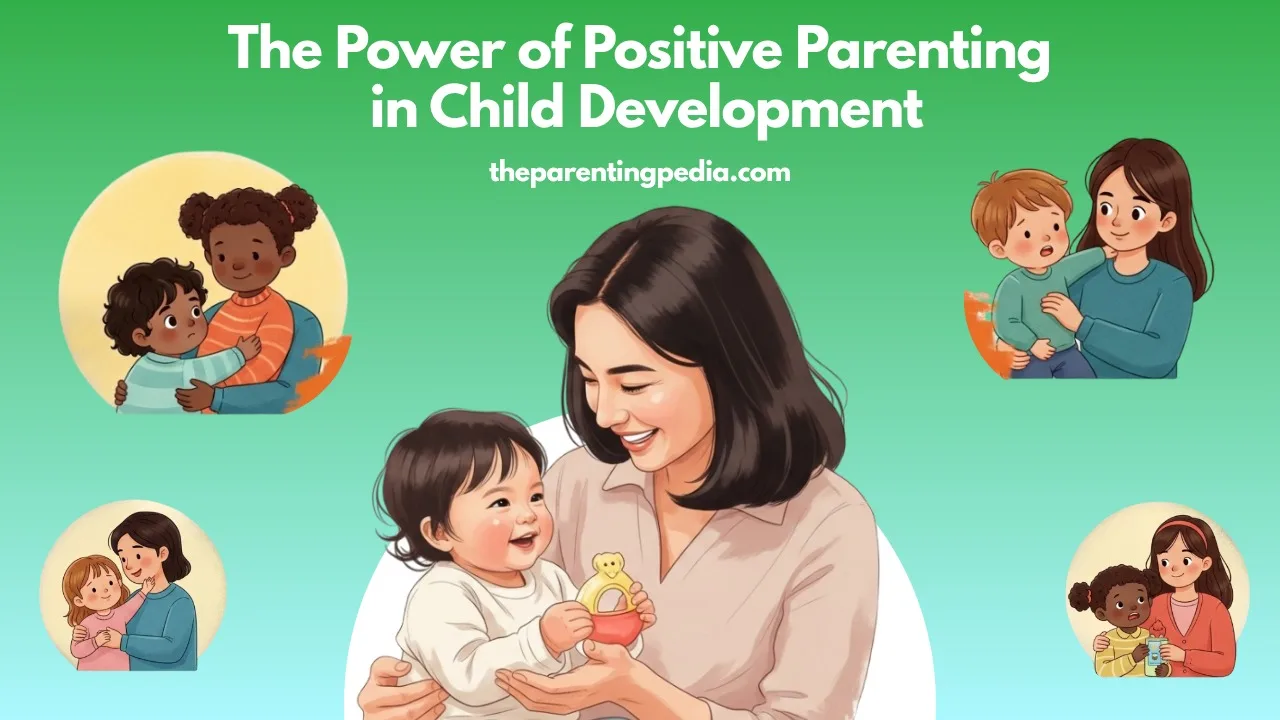Parenting is one of the most rewarding yet challenging jobs in the world. Every parent wants their child to grow up to be happy, confident, respectful, and successful. But how can parents help their children reach their full potential? One powerful way is through positive parenting. Positive parenting is about building a strong, respectful and loving relationship with your child. It focuses on encouragement instead of punishment, guidance instead of control and communication instead of shouting. It is not about being a “perfect parent” but about being a present and understanding one. In this article, we will explore what positive parenting means, why it is important and how it can be practiced in everyday life.
What is Positive Parenting?
Positive parenting is a parenting style that emphasizes importance of love, warmth, structure and respectful guidance. It means setting clear boundaries but also showing empathy, listening to your child’s feelings and helping them learn from mistakes rather than punishing them harshly. It encourages parents to focus on understanding the child’s emotions and behavior, teaching rather than punishing, building trust and open communication, encouraging independence and responsibility and being patient and supportive towards them. Positive parenting is not letting children do whatever they want nor it is harsh treatment towards children like shouting, hitting or criticizing. It creates a healthy balance where children feel safe, valued and motivated to do well.

Why is Positive Parenting Important?
1. Builds Strong Emotional Bonds
When parents respond to their child with love and empathy, it strengthens the emotional connection. This secure bond makes children feel safe, valued and loved. They know they can rely on their parents, which builds confidence and emotional strength in children.
2. Promotes Better Behavior
Children who grow up in a positive parenting environment are more likely to behave well. They understand what is expected of them and are more willing to follow rules. Instead of being afraid of punishment, they learn to make better choices because they understand the reasons behind the rules.
3. Boosts Self-Esteem
Positive parenting encourages children to try new things, make decisions and learn from mistakes without fear of being judged. This builds self-confidence in children and helps them believe in their abilities.
4. Improves Communication
In positive parenting, children are encouraged to share their feelings and thoughts. This open communication helps parents understand what the child is going through and also teaches children how to express themselves in a healthy way.
5. Reduces Stress for Parents and Children
Harsh discipline, constant yelling or conflict increases stress in the home. Positive parenting creates a more peaceful and supportive environment, reducing anxiety and frustration for both parents and children.
Key Principles of Positive Parenting
1. Show Love and Affection Daily
Even on busy or stressful days, showing your child love makes a huge difference. Hugs, kind words and smiles help children feel secure. Say “I love you” to children often and praise their efforts also not just achievements.
2. Set Clear Rules and Be Consistent
Children need structure to feel safe. Set clear and reasonable rules and explain the reasons behind them. Be consistent in following rules so your child knows what to expect. This helps reduce confusion and builds respect of children towards parents for being fair and consistent.
3. Use Discipline to Teach, Not Punish
Instead of yelling or hitting, guide your child to understand the consequences of their actions. For example, if they make a mess, ask them to help clean it up. This teaches children responsibility and problem-solving skills.
Also Read: The Impact Of Mental Trauma On Children And Teenagers
4. Listen to Your Child
Make time to listen without interrupting. This shows that you value their thoughts and helps them feel heard and understood. It also helps you spot problems early and strengthen your bond with children.
5. Be a Good Role Model
Children learn by watching their parents. If you handle stress calmly, speak respectfully and treat others kindly, your child will learn to do the same. Show children how to manage emotions, apologize when wrong and solve problems peacefully.
6. Encourage Independence
Allow your child to make age appropriate choices like choosing clothes, packing their school bag or helping with small tasks at home. This builds confidence and a sense of responsibility in children.
7. Stay Patient and Calm
Children are still learning how to manage emotions. They will make mistakes, test limits and sometimes behave poorly. Staying calm in tough situations teaches them self control and shows that you are in control too.
Examples of Positive Parenting
Here are a few examples of how positive parenting looks in real life:
- Child throws a tantrum in public: Instead of shouting or scolding, speak gently, and say to child, “I see you are upset. Let’s take a deep breath together.” Give them a moment to calm down and remind them you are there to help not to punish.
- Child breaks a rule: Stay calm and get down to their level. Gently explain to child, “Hitting is not okay because it hurts others. I understand that you are feeling angry or frustrated, but we use our words to express those feelings not our hands.”
- Child does well in school: Say to child, “I am proud of the hard work you put into this” instead of just “Good job.” This kind of praise encourages children to focus on their effort and hard work, not just the final results.
- Child refuses to do homework: Sit down with your child, try to understand what is bothering them, and offer your help by saying something like, “Is something confusing? Let’s figure it out together.” This shows children that you are there to support them, not just to correct them.
Using Positive Parenting to Overcome Common Challenges
Every parent faces challenges. Positive parenting may not make everything easy, but it helps you respond to challenges in better ways.
1. Dealing with Disobedience
Instead of reacting with anger, parents should try to understand the reason behind the behavior. Ask, “What happened?” rather than “Why did you do that?” Work together on a solution with the child.
2. Sibling Fights
Parents should teach their children how to express disagreement respectfully by encouraging them to take turns, share with others and talk through problems calmly and thoughtfully.
3. Screen Time Battles
Set clear rules about screen use. Offer alternatives like outdoor play, reading or helping in the kitchen. Parents should set a good example by practicing healthy screen habits themselves.
4. Parental Burnout
It is important for parents to take care of themselves, as one cannot pour from an empty cup. Taking time to rest, connecting with other parents and accepting that perfection is not required can help maintain emotional well-being and effective parenting.

Conclusion
Positive parenting is not about being soft or letting children do as they wish. It is about guiding with love, setting healthy limits and teaching life skills through kindness, patience and respect. In a world that is often fast-paced and stressful, children need safe spaces to grow emotionally and mentally. That safe space begins at home with parents who understand, listen, guide and love unconditionally. Parents should understand that it is not necessary to be a perfect parent, being a positive one is enough. Love, attention and consistent support are some of the greatest gifts a child can receive.
FAQ
How positive parenting affects child development?
Positive parenting promotes a child’s emotional, social and cognitive development by creating a supportive and loving environment. It builds self-esteem, encourages good behavior and strengthens communication skills. Children raised with positive parenting are more confident, resilient and better equipped to handle challenges, forming strong foundations for a successful future.
What are the 5 aspects of positive parenting?
The five key aspects of positive parenting are showing love and warmth, setting clear and consistent boundaries, using discipline to teach not punish children, encouraging open communication and promoting independence. These elements help children feel secure, confident and supported leading to healthier emotional and social development throughout their lives.
